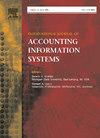数字化转型自愿披露:欧洲领先企业的见解
IF 6
3区 管理学
Q2 BUSINESS
International Journal of Accounting Information Systems
Pub Date : 2024-09-29
DOI:10.1016/j.accinf.2024.100711
引用次数: 0
摘要
本文的第一个目标是,以欧洲领先企业的数字化转型(DT)自愿披露实践为起点,提出数字化转型(DT)自愿披露指南。第二个目标是分析可能影响这些公司采用 DT 报告实践的因素。本文章由计算机程序翻译,如有差异,请以英文原文为准。
Digital transformation voluntary disclosure: Insights from leading European companies
Purpose
The first goal of this paper is to propose guidelines for digital transformation (DT) voluntary disclosure, using as a starting point the DT voluntary disclosure practices followed by leading European companies. As a second goal, we analyse the factors that may be influencing the DT reporting practices adopted by these companies.
Design/ methodology/ approach
This paper combines qualitative text data mining and panel least squares methodologies to explore current DT disclosure practices followed by leading European companies in their annual reports, and to test our hypotheses identifying the factors that may be influencing the DT reporting practices.
Findings
Our findings show that leading European companies are currently disclosing information about DT on a voluntary basis. However, we find significant differences in their reporting practices, which means that there is still a lack of standardization that can be overcome through DT voluntary disclosure guidelines. Our study contributes to the literature by showing the significant effect of company size, economic sector, the Covid-19 pandemic and CEO gender on DT voluntary disclosure practices.
Originality
We created DT voluntary disclosure guidelines for leading European companies. Having globally harmonised disclosure practices may lead to making meaningful comparisons among companies. Furthermore, results from the panel least squares method significantly contribute to our understanding of the factors that shape the disclosure practices of companies regarding their DT voluntary disclosure initiatives.
求助全文
通过发布文献求助,成功后即可免费获取论文全文。
去求助
来源期刊
CiteScore
9.00
自引率
6.50%
发文量
23
期刊介绍:
The International Journal of Accounting Information Systems will publish thoughtful, well developed articles that examine the rapidly evolving relationship between accounting and information technology. Articles may range from empirical to analytical, from practice-based to the development of new techniques, but must be related to problems facing the integration of accounting and information technology. The journal will address (but will not limit itself to) the following specific issues: control and auditability of information systems; management of information technology; artificial intelligence research in accounting; development issues in accounting and information systems; human factors issues related to information technology; development of theories related to information technology; methodological issues in information technology research; information systems validation; human–computer interaction research in accounting information systems. The journal welcomes and encourages articles from both practitioners and academicians.

 求助内容:
求助内容: 应助结果提醒方式:
应助结果提醒方式:


